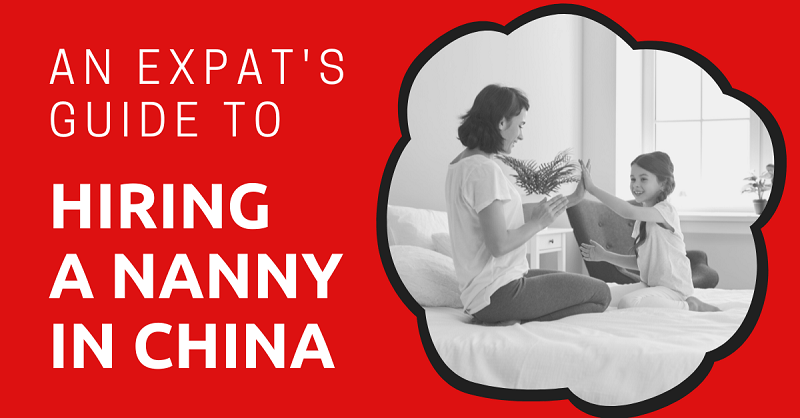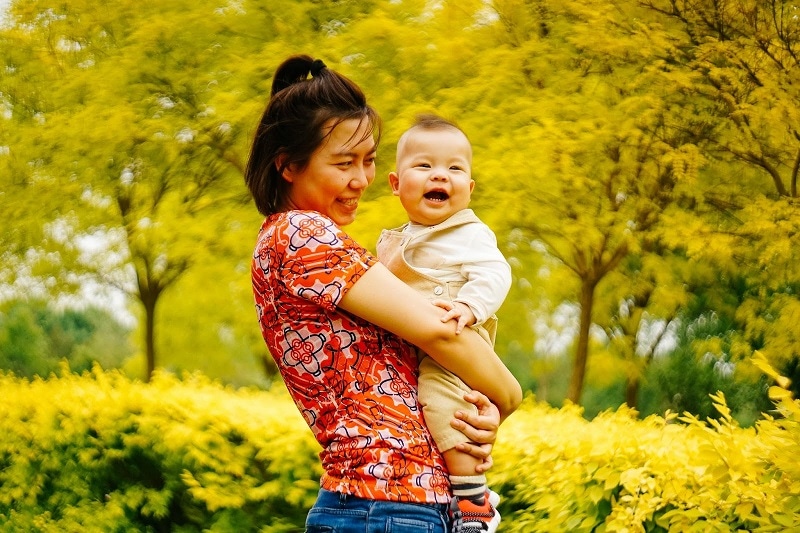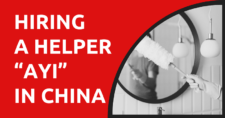
Getting a nanny in China is very common among expats and the costs are more affordable than in many countries. Nannies are usually women between 45 and 60 years old. You will find many who are skilled and competent, and often become part of the family.
In China, you can refer to a nanny as ‘Ayi’ (阿姨 – ā yí), which kind of means aunt. You can also use this term to address your housekeeper, cleaner, and, a polite way to address any older woman.
It is not complicated to get an ayi in Shanghai. However, getting a good one might be more challenging. A reliable nanny may not only be a person who takes care of your children but also can be your advocate in China. She can help you pay bills, speak to the building management staff, or help with any other matters that might come up which require the advice of a local.
This article will take approximately 12 minutes to read. Don't have the time right now? No worries. You can email the ad-free version of the article to yourself and read it later!
Disclaimer: This article may include links to products or services offered by ExpatDen’s partners, which give us commissions when you click on them. Although this may influence how they appear in the text, we only recommend solutions that we would use in your situation. Read more in our Advertising Disclosure.
Contents
Types of Nanny in China
In Shanghai, we can distinguish three types of nannies:
Babysitter Nanny
You can get a nanny who will exclusively babysit. She might be part-time or full-time, often living in her own place and spending weekdays with your children. Most nannies speak only Chinese. Hiring a Chinese-speaking ayi might be a good idea, especially if your child is learning Chinese so they can practice and learn through immersion.
Her jobs:
- Babysitting at pre-arranged times
- Preparing food for the children
- Picking-up and taking kids to school.
- Taking children to activities and playdates
- Accompanying parents and children to medical appointments
Nanny Housekeeper
If you are a busy person and you have the space to add one more person to your home, you can hire a full-time nanny housekeeper (全职保姆 – quán zhí bǎo mǔ). She will usually live-in and spend 6 days per week with your kids, usually using the time they are at school to take care of all the shopping, cooking, and cleaning.
Her jobs:
- Babysitting
- Cooking
- Cleaning
- Ironing
- Laundry
- Grocery shopping
- Organizing the house, bills, repairs, and more
Newborn Nanny
A Yuesao (月嫂 – yuè sǎo) is a doula who takes care of a newborn and mother during the first 26 days of the baby’s life.
This type of nanny is popular in Asia. The first month after birth in China is called “sitting the month” or “zuo yuezi”. According to Chinese tradition, mothers should not leave home, shower, do any work, or even use the air conditioner for a month after they give birth. This is said to help women recover faster and balance the energy in their body.

While modern Chinese women sometimes practice a more flexible version of zuo yuezi, Chinese people do believe this period is most vulnerable for mommies and babies, and they recommend following strict diet and lifestyle rules.
For this period after birth, a Yuesao will take care of the baby, and help the new mommy to adjust to the new life and recover. If you do not want someone forcing you to stay in bed and hovering around you all day and night, you might want to avoid a traditional Yuesao though, she can be bossy and overbearing in her methods.
Her jobs:
- Baby’s health. Yuesao will check the body temperature and take care of the umbilical cord. She will bathe, massage, and do daily exercises with the baby.
- Mommy’s health. Yuesao will help the new mother with lactation and give daily body massages. If the mother had a cesarean section, yuesao helps with wound cleaning and disinfection.
- Housekeeping. She can prepare daily meals, clean the house, and do laundry.
This type of nanny should hold qualifications as a nursery professional.
How to find a Nanny in China
You can find a nanny by yourself or contact an agency to do it for you. Either way, you will need to interview her. You can invite a nanny for the trial day and check how she behaves with your baby and how the baby feels about her. Even nannies with excellent recommendations can disappoint you. We are all different and have different requirements.
Agencies
Hiring an agency is a secure way to go, as they will be an intermediary between you and the nanny, and if there are issues, the agency can handle them.
The benefit of hiring a professional agency is that they will take care of the medical certificates, criminal records, and insurance. These papers are super important as you trust this person with your child. An agency can also adjust the search to your needs. For instance, they can find a bilingual nanny.
One of the popular agencies in Shanghai is AyiMatchMaker. This agency was created by three expats. They can find you not only a perfect nanny but also a housecleaner and a chauffeur. Once you send your requirements, they will arrange the interviews with the candidates. After you pick your preferred ones, you can invite an ayi for a trial day. The service fee is one month of the nanny’s salary during the first year and a reduced fee for every renewal.
Another popular agency among expats in Shanghai is XinMu Domestic Service agency. You can find different ayi profiles on their website. Their Customer Service speaks English. They also organize training for their ayis, such as basic English and cooking classes of western dishes.
Recommendations
Word of mouth is a convenient way to find a nanny in Shanghai. Usually, the expats who leave the country will recommend their ayi to other expats. You can join many groups on WeChat for ayi recommendations.
The big plus is that you can directly contact the family with whom the nanny worked before to ask questions. You can ask your colleagues for invitations to WeChat groups to find an ayi.
Costs
The price of hiring a nanny will vary depending on the type of nanny and the shifts you choose.
The current average price for an ayi is 40-45 RMB per hour in Shanghai (a full-time shift is a minimum of 6,400-7,200 RMB per month). However, the costs of bilingual ayi will be higher.
The service of yuesao is also much more expensive, a minimum of 10,000 RMB per month. Some nannies charge a higher rate for the weekend or late hours. If you ask the nanny to stay late, she might also ask you to pay for her taxi, so she can go home at night.
If you invite a nanny for a trial day, you should also pay for these hours.
You can use Alipay or WeChat to pay her salary. Most nannies prefer to be paid monthly at the end of the month.
It is common to pay a thirteen-month salary which serves as an and-of contract bonus. You might also give them a red envelope (红包 – hóngbāo) at Chinese New Year as is customary. All of this is up to you and your arrangements with your ayi.
Contract
You are not obliged to sign a contract with your nanny in China. But a contract is beneficial for a full-time nanny or yuesao.
If you decide to sign a contract, it is going to be a “Civil Contract,” which is not subject to the Labor Law. So, you are also not obliged to pay any tax, as this is a free-will contract between two individuals and does not fall under the Labor Law regulations. The law leaves the formal arrangements to these individuals. You can agree on terms in an oral and written way.
The contract should comprise:
- Working hours
- Salary
- Overtime
- Annual leave, sick leave
- Notice period
You can find many templates online for bilingual contracts. Here is a great example for around $5. Keep it simple and double-check that the Chinese version is correct.
Annual, Holiday, and Sick Leaves
You also are not obliged to provide annual and sick leaves for the nanny, but please consider it, all humans get sick and it’s better not to have a sick person taking care of your kids.
An ayi might ask you for the days off during the Chinese national bank holidays. The longest holidays in China are the National Day holidays in October, the Spring Festival in January (Chinese New Year), which lasts a week, and then five days in May during the Labor Day holidays.
It is also recommended to mention the notice period in the contract. Two weeks will be ok to notify your ayi that you do not need services.
Things to Consider
When getting a nanny for your children, you need to consider some crucial points.
Language
Many nannies will not speak even basic English. So if English language is crucial for you, you will need to pay more, as English-speaking nannies are harder to find. There are benefits to hiring only Chinese-speaking nannies. You and your children can learn Chinese faster and this is great for your children’s future.
Many expats who hire only Chinese-speaking ayis use WeChat for communication. You can translate the text directly in chat.
If you hire a nanny who does not speak English, work with a translator to prepare steps for her to follow in case of emergency and accidents. Give her also your insurance number so she can go to the hospital with your children, and also provide her with emergency contacts from your family.
Full-Time, Part-Time, Night Shifts
You can get an ayi for a full-time, part-time, or an ayi who can work just for night shifts. It is common also to get an ayi who will live in. It all depends on your needs and the amount of housework she will do.
It is much easier to find an ayi full-time than part-time, as this is much more convenient for them and many want a live-in job. However, some expats prefer a part-time ayi. You can always ask your neighbors or colleagues if they want to share their full-time nanny with you.
You can also discuss the weekend schedule. Some ayis can stay overnight during the weekend, so you can go out with your partner.
Cultural Differences
In each culture, there are different approaches to raising children. When you interview your ayi, you might get a glimpse of her style, however, you will need more time to gain a complete picture because many cultural differences may occur.
In China, they often use a pillow for newborns and babies to avoid “flat head syndrome.” But in many countries, people do not put these kinds of pillows in a baby’s crib, as it creates a risk of suffocation.
Another example is a hat. Many Chinese grandmothers will tell you that a newborn should wear a hat not only outside but at home too, as a hat can protect a newborn’s head. It might be true, but there is a risk of overheating, as babies lose excess heat through their heads.
There are many examples of different approaches. So do not be shy to instruct your nanny about how she should look after your children. Observe her for at least the first month: how she behaves with your children, whether she is too soft or too strict; how she communicates. Follow your instincts about the person you hire.
Due Diligence
Ask your nanny to provide you with her medical records to ensure that she does not possess any contagious diseases, such as hepatitis or tuberculosis. A criminal record is very crucial here too. If you hire a yuesao (doula), request a Nursery Professional Qualification Certificate.
Insurance
Getting an ayi via an agency can help you avoid a headache about insurance. The agency will be responsible for the insurance of the property and employee. If you are getting an ayi on your own, check if ayi has insurance in case of any domestic incidents.
There is always a risk when you let a stranger enter your home. You might hear many stories about when ayi took advantage of the foreigner’s home. Nowadays, these situations occur less and less often. But it is always important to stay vigilant. Do not give ayi keys from your home on day one. Be present during her first working days. Also, if you do not sign a contract with her, at least take a photo of her ID card.
Now, on to You
Finding a perfect nanny for your children might be an exhausting experience. We want to trust the person with whom we leave our little ones. A reliable channel is key.
If you search for a nanny yourself, check her references and contact previous families. Request medical certificates and also criminal records. Safety is critical.
Before interviewing, prepare a list of the things which are crucial to you. Instruct you ayi and explain to her the actions she needs to take in case of an emergency or accident. Check minor details. For example, did the nanny wash and disinfect her hands after entering your home; did she change her clothes, and did she arrive on time? Little things make big things happen.






